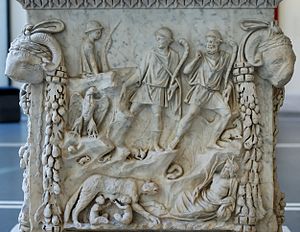අබ් ඌර්බෙ කෝන්ඩිටා ලිබ්රී (ලිවී)
Appearance

අබ් ඌර්බෙ කෝන්ඩිටා ලිබ්රී—බොහෝ විට අබ් ඌර්බෙ කෝන්ඩිටා ලෙසින් කෙටි කර දැක්වෙන—යනු, ලිවී ලෙසින්ද හැඳින්වෙන ඉතිහාසඳ ටිටූස් ලීවියුස් විසින් ලතින් භාෂාවෙන් රචිත, ක්රිපූ 27 සහ 25 අතර කිසියම් කාලයක ඇරඹුනු[1] පුරාතන රෝමයෙහි ඉතිහාසය පිළිබඳ අනුස්මරණීය කෘතියකි.
- ^ 1911 Encyclopædia Britannica: "Livy", "From Analysis of the History" section: Various indications point to the period from 27 to 20 BCE, as that during which the first decade was written. In the first book (19.3) the emperor is called Augustus, a title which he assumed early in 27 BCE, and in ix. 18 the omission of all reference to the restoration, in 20 BCE, of the standards taken at Carrhae seems to justify the inference that the passage was written before that date. In the epitome of book lix. there is a reference to a law of Augustus which was passed in 18 B.
